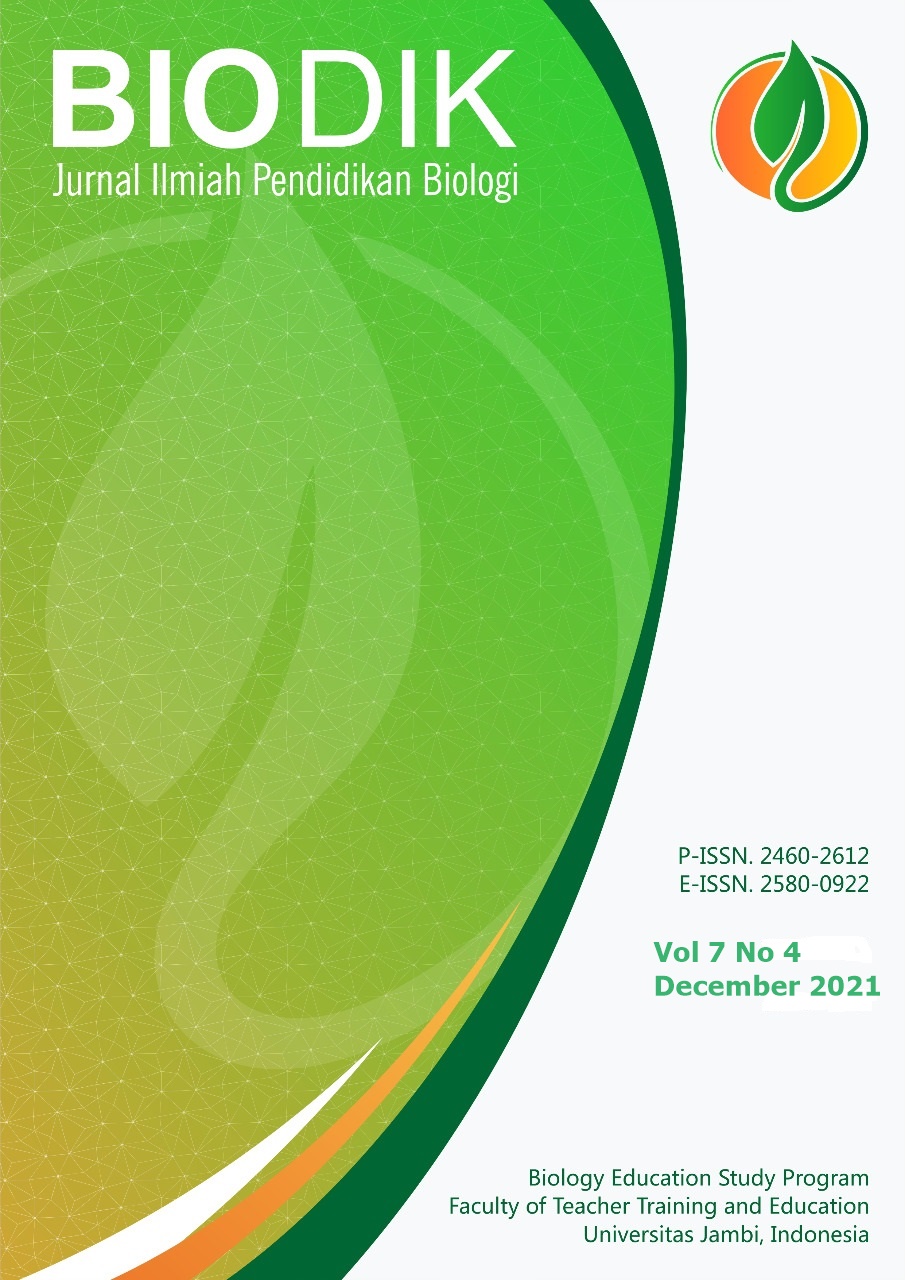Pengaruh Model Socio-Scientific Issue Terhadap Keterampilan Memecahkan Masalah Menggunakan Aplikasi Powtoon pada Materi Perubahan Lingkungan
(Effect of Socio-Scientific Issue Model on Problem Solving Skills Using Powtoon Application on Environmental Change Materials)
DOI:
https://doi.org/10.22437/bio.v7i4.13758Abstract
.
Downloads
References
Ahghar, G. (2012). Effect of Problem-solving Skills Education on Auto-Regulation Learning of High School Students in Tehran. Procedia - Social and Behavioral Sciences, 69, 688–694. https://doi.org/10.1016/j.sbspro.2012.11.462
Aisya, N., Wibowo, Y., & Aminatun, T. (2017). The Influence Of Socio-Scientific Issues On Reflective Judgment Of High School’s Student In Ecosystem Material. Jurnal Bioedukatika, 4(2), 14. https://doi.org/10.26555/bioedukatika.v4i2.5346
Anagün, Ş. S., & Özden, M. (2010). Teacher candidate’s perceptions regarding socio-scientific issues and their competencies in using socio-scientific issues in science and technology instruction. Procedia - Social and Behavioral Sciences, 9, 981–985. https://doi.org/10.1016/j.sbspro.2010.12.271
Ariyanto, R., Kantun, S., & Sukidin, S. (2018). Penggunaan Media Powtoon Untuk Meningkatkan Minat Dan Hasil Belajar Siswa Pada Kompetensi Dasar Mendeskripsikan Pelaku-Pelaku Ekonomi Dalam Sistem Perekonomian Indonesia. JURNAL PENDIDIKAN EKONOMI: Jurnal Ilmiah Ilmu Pendidikan, Ilmu Ekonomi Dan Ilmu Sosial, 12(1), 122. https://doi.org/10.19184/jpe.v12i1.7622
Ernalida, Yenni Liyawati, Ansorm Abdu Gafur, Nurul Hikmah, R. U. (2018). Powtoon : Media Pembelajaran Berbasis Teknologi Informasi Sebagai Upaya dalam Menciptakan Pembelajaran yang Menarik dan Kreatif. 132–137.
Harjanto, N. T. (2008). DAMPAK LINGKUNGAN PUSAT LISTRIK TENAGA FOSIL DAN PROSPEK PLTN SEBAGAI SUMBER ENERGI LISTRIK NASIONAL. Nur Tri Harjanto. Pusat Teknologi Bahan Bakar Nuklir.
Harnani, S. (2020). EFEKTIVITAS PEMBELAJARAN DARING DI MASA PANDEMI COVID-19. 2020-07-07. https://bdkjakarta.kemenag.go.id/berita/efektivitas-pembelajaran-daring-di-masa-pandemi-covid-19
Hassan, S. A. H. S., Yusof, K. M., Mohammad, S., Abu, M. S., & Tasir, Z. (2012). Methods to Study Enhancement of Problem Solving Skills in Engineering Students Through Cooperative Problem-Based Learning. Procedia - Social and Behavioral Sciences, 56, 737–746. https://doi.org/10.1016/j.sbspro.2012.09.711
Korkmaz, S., Kazgan, A., Çekiç, S., Tartar, A. S., Balcı, H. N., & Atmaca, M. (2020). The anxiety levels, quality of sleep and life and problem-solving skills in healthcare workers employed in COVID-19 services. Journal of Clinical Neuroscience, 80, 131–136. https://doi.org/10.1016/j.jocn.2020.07.073
LIPI. (2020). Peningkatan Sampah Plastik dari Belanja Online dan Delivery Selama PSBB | Lembaga Ilmu Pengetahuan Indonesia. 2020-05-23. http://lipi.go.id/berita/single/Peningkatan-Sampah-Plastik-dari-Belanja-Online-dan-Delivery-Selama-PSBB/22037
Maryadi. (2020). Membandingkan Hasil Uji Statistika Parametrik dan Nonparametrik ( Studi Kasus : Pelaksanaan Kebijakan Pengendalian Dana Idle Pemerintah Daerah ). Jurnal Of Applied Managerial Accounting, 4(1), 142–149.
Nayazik, A. (2017). Pembentukan Keterampilan Pemecahan Masalah Melalui Model IDEAL Problem Solving Dengan Teori Pemrosesan Informasi. Kreano, Jurnal Matematika Kreatif-Inovatif, 8(2), 182–190. https://doi.org/10.15294/kreano.v8i2.7163
Nuangchalerm, P. (2010). Engaging students to perceive nature of science through socioscientific issues-based instruction. European Journal of Social Sciences, 13(1), 34–37.
Nurdiansyah, E., Faisal, E. El, & Sulkipani, S. (2018). Pengembangan media pembelajaran berbasis PowToon pada perkuliahan Pendidikan Kewarganegaraan. Jurnal Civics: Media Kajian Kewarganegaraan, 15(1), 1–8. https://doi.org/10.21831/jc.v15i1.16875
Nuryani Rustaman. (2006). Literasi Sains Anak Indonesia 2000 & 2003. Makalah Pada Seminar Sehari Hasil Studi Internasional Prestasi Siswa Indonesia.
Paidi. (2010). Model Pemecahan Masalah dalam Pembelajaran Biologi di SMA.
Redhana, I. W. (2019). Mengembangkan Keterampilan Abad Ke-21 Dalam Pembelajaran Kimia. Jurnal Inovasi Pendidikan Kimia, 13(1).
Setyadi, T. Y., Mardiyana, & Triyanto. (2019). Mathematical problem solving skills using IDEAL model based on personality type. AIP Conference Proceedings, 2194(December). https://doi.org/10.1063/1.5139847
Shettar, A., Vijaylakshmi, M., & Tewari, P. (2020). Categorizing student as a convergent and divergent thinker in problem-solving using learning analytics framework. Procedia Computer Science, 172(2019), 803–810. https://doi.org/10.1016/j.procs.2020.05.001
Suryawati, E., Osman, K., & Meerah, T. S. M. (2010). The effectiveness of RANGKA contextual teaching and learning on student’s problem solving skills and scientific attitude. Procedia - Social and Behavioral Sciences, 9, 1717–1721. https://doi.org/10.1016/j.sbspro.2010.12.389
Vaille Maree Dawson, G. V. (2010). Teaching Strategies for Developing Students’ Argumentation Skills About Socioscientific Issues in High School Genetics. Res Sci Educ, 40, 133–148. https://doi.org/10.1007/s11165-008-9104-y
Zeidler, D. L., Sadler, T. D., Simmons, M. L., & Howes, E. V. (2005). Beyond STS: A research-based framework for socioscientific issues education. Science Education, 89(3), 357–377. https://doi.org/10.1002/sce.20048
Downloads
Published
How to Cite
Issue
Section
License
Copyright (c) 2021 Elsa Hanifah, Setiono Setiono, Gina Nuranti

This work is licensed under a Creative Commons Attribution-NonCommercial-ShareAlike 4.0 International License.
Copyright Notice
Authors who publish with Biodik : Jurnal Ilmiah Pendidikan Biologi agree to the following terms:
- For all articles published in Biodik : Jurnal Ilmiah Pendidikan Biologi, copyright is retained by the authors and grant the journal right of first publication with the work simultaneously licensed under a Creative Commons Attribution-ShareAlike 4.0 International Licensethat allows others to share the work with an acknowledgment of the work's authorship and initial publication in this journal.
- Authors are able to enter into separate, additional contractual arrangements for the non-exclusive distribution of the journal's published version of the work (e.g., post it to an institutional repository or publish it in a book), with an acknowledgment of its initial publication in this journal.
- Authors are permitted and encouraged to post their work online (e.g., in institutional repositories or on their website) prior to and during the submission process, as it can lead to productive exchanges, as well as earlier and greater citation of published work (See The Effect of Open Access).
















